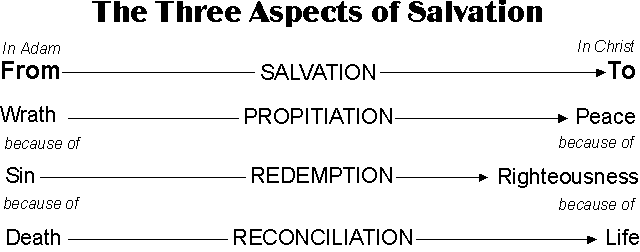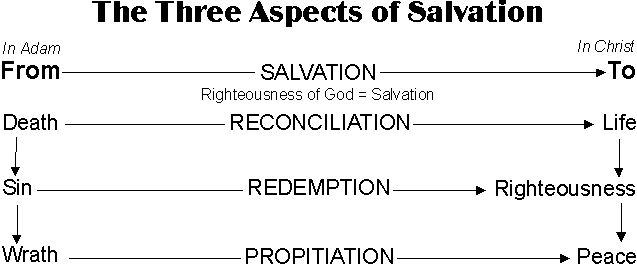- the past tense -- we have been saved,
- the present tense -- we are being saved,
- and the future tense -- we shall be saved.
FROM DEATH TO LIFE
THE BIBLICAL DOCTRINE OF SALVATION
Author: Ray Shelton
SYNOPSIS OF THE BOOK

From the examination of the Biblical doctrine of sin and death in Chapter 1 of my book, From Death to Life, it became clear that man needs to be saved because man is spiritually dead. Man is separated and alienated from God. He does not know God, and because he does not know the true God, he turns to false gods -- that which is not God -- and makes these into his gods (Gal. 4:8). Man's basic sin is idolatry -- trust in a false god, and he sins (chooses these false gods) because he is spiritually dead -- separated from the true God ("because of which [death] all sinned," Rom. 5:12d ERS). This separation is not the result of a man's own personal sins. He received this spiritual death, along with physical death, from Adam, from his first parents. The historical origin of sin is the fall of Adam -- the sin of the first man. Adam's sin brought death, and this death has been spread throughout the whole human race, to all Adam's descendants (Rom. 5:12). This is why man needs to be saved. He is dead spiritually and dying physically. He needs life -- he needs to be made alive -- to be raised from the dead. This spiritual death inherited from Adam is the personal, contemporary origin of each man's sin. This is what the last phrase of Rom. 5:12 says; "because of which [death] all sinned." And if he receives life, if he is made alive to God, man will then be saved from sin. By removing the cause of sin -- spiritual death -- by giving him spiritual life, God delivers man from sin. For just as sin flows from death, so righteousness -- trust in the true God -- flows from life. Salvation is primarily from death and then secondarily from sin. And since God's wrath -- God's opposition to sin -- is caused by sin (Rom. 1:18), the removal of sin brings with it also the removal of wrath. Salvation is then also from wrath.Propitiation is salvation from wrath to peace.
Redemption is salvation from sin to righteousness.
Reconciliation is salvation from death to life.
Propitiation, Redemption, and Reconciliation are the three aspects of salvation.

These are the three aspects of the salvation that was accomplished for us through the death and resurrection of our Lord Jesus Christ.
In chapter 4, we saw that this is exactly what God accomplished through the death and resurrection of Jesus, His Son. God in the person of His Son entered into our death so that He might deliver us from death by raising Jesus from the dead. His resurrection is our resurrection, and we are made alive with Him and in Him. Thus taking away the cause of our sin, He saves us from sin. Jesus died for our sins -- literally -- to take them away, not just the guilt of sin but sin itself. For, being made alive to God with Christ, we now in faith trust in the true God. This faith in God is the opposite of sin, which is trust in a false god. We have turned from our false gods to serve and trust the true God that we now know. This faith is righteousness (Rom. 4:3, 5), and it comes from knowing personally the true God through His Son, Jesus Christ. To know Him is life (John 17:3), and to know Him is to trust Him. For He is love and love begets trust. The death of Christ for us not only demonstrates God's love for us but is also the means by which that love is made known to us. By Jesus entering into our death through His death on the cross, God could remove that death in the resurrection of Jesus. Now in the resurrection of Jesus the barrier of death is removed. We see God revealed as never before. We know Him now, having been made alive to God in the resurrection of Jesus. To be alive spiritually is to know God (John 17:3). And being made alive to God in Jesus is to know the love of God. Thus the death of Jesus is more than a demonstration of love -- it is the means by which that love could remove the barrier of death, and thus make us alive to God Himself, revealing Himself to us. The trust that this love invokes is righteousness; it relates us rightly to God. Thus by taking away death, God takes away sin. And by taking away sin, God takes away His wrath.

Being made alive, we are set right with God through faith. We are justified -- set right -- through the faith that resulted from the righteousness of God; that is, the act of God by which He sets us right with Himself. God sets us right with Himself by making us alive to Himself. And the faith flowing from that life is that right relationship to Him. It is faith in the risen Christ through Whom we are made alive to God that is righteousness (Rom. 10:9-10). Justification is not a legal act but the real act of God whereby He puts us into a right personal relationship -- sets us right -- with Himself. He did this by making us alive to God in Christ. This is no legal fiction but reality -- we are alive to God in Christ. And being made alive, we believe; we trust the God we now know, having been made alive to Him. This faith is righteousness; it relates us rightly to God (it is the opposite of the sin of idolatry - trust in a false god). This righteousness of faith is no legal fiction. To be alive to God is to trust Him. And this is the reality that the salvation of God has produced. God is not concerned about legal formalities and technicalities. He is concerned about the reality of making us alive to Himself, and the faith that trusts Him and His love.
It is at this point that the Biblical doctrine of salvation opposes that misunderstanding and distortion of the law -- legalism. In chapter 2, we discussed the law of God as God's covenant with Israel and legalism as a misunderstanding and distortion of that law. Legalism -- as basically an idolatry of the law -- leads to and involves a misunderstanding of sin and death. Legalism misunderstands sin as only law breaking, as falling short of the universal standard of the law. And death is misunderstood as always the penalty of sin. And the wrath of God is misunderstood as only the punishment of sin. The immediate personal origin of sin has been misunderstood to be an inherited sinful nature, making sin instrinsic to human nature and implying a denial of human freedom and responsibility. This legalistic conception of sin and death leads to a misunderstanding of the need for salvation and the nature of salvation.
In chapter 3, we discussed this legalistic misunderstanding of the need of salvation. According to this legalistic view, man needs salvation because he is a guilty sinner. He is guilty not only because of his own sins, transgressions of the law, but because of the sin of Adam whose sinful nature he has inherited. Whether he has had the guilt of Adam's sin imputed to him or he is guilty because he somehow sinned in Adam, man is guilty. Upon him rests the load of racial guilt as well as the guilt from his own personal sins. He needs to be saved because he is guilty. Salvation is accordingly conceived of as a removal of that guilt.
In chapter 5, we discussed this legalistic misundertanding of salvation. According to the legalistic theology, justice requires that the penalty be paid before the guilt can be removed. It cannot be forgiven freely but can be only taken away by paying of the penalty which alone can satisfy justice. Because of the enormity of the guilt -- it is against an infinite moral being -- finite man himself can never pay the penalty and go free. His sin demands an eternal punishment, and being finite man cannot meet the infinite demands of justice. If man is to be saved at all, he must be saved by another, by one who is a man like himself but without sin. But also one who is God who alone can meet the infinite demands of justice. Where is such a one to be found? Only God can provide that one, and God has provided the perfect sacrifice to pay the penalty of sin by sending His Son to become man. His death is the perfect sacrifice to satisfy the demands of justice. It can remove the guilt by paying the penalty of sin. In His death, He endured the eternal punishment due to man's sin.
According to this legalistic theology, it is not enough just to be declared not guilty, man must be also have a righteousness which merits eternal life. He must not only have no guilt, no demerits, but he must also have a positive righteousness, merits placed to his account. Since man cannot earn this righteousness himself because of his sinful nature (he is not able not to sin and not able to do righteousness -- good works which merit eternal life as a reward), someone must earn this for him. According to this legalistic point of view, salvation is not only a vicarious satisfation of the demands of justice and the law, but it is also vicarious law-keeping. Christ's life of active obedience under the law provides that righteousness -- Christ earns for us eternal life by His active obedience before His death on the cross. By His passive obedience of His death on the cross, He paid the penalty of our sins. Therefore, the one who receives in faith Christ's work for him is declared not guilty, and Christ's righteousness or merits of Christ is imputed to his account. The believer is justified, declared righteous, because Christ has satisfied the demands of justice and fullfilled the law for us. The believer is legally entitled to eternal life if he receives it from Christ who earned it for him. Thus salvation is understood legalistically. It is a legal transaction -- a fire insurance policy that another paid for and given freely to anyone if they will take it.
This is a consistent and logical explanation of salvation and man's need of salvation. There is only one difficulty with it -- it is not true. Yes, Christ died for man to take away his sin. The fact of Christ -- who He is and what He did -- is true, but the explanation is all wrong; it is legalistic. Salvation is not by works, even though another -- even God -- performs them. God is not the kind of God that the legalist thinks He is. He is not a God of justice but a God of love. The righteousness of God has been misunderstood as justice. According to the Scriptures (Psa. 31:1; 71:2; 143:1-2; 98:2; Isa. 46:13; 51:5; 56:1), the righteousness of God is the act of the love of God by which God sets us right with Himself and saves us. God sets us right with Himself by making us alive to Himself. And the faith flowing from that life is that right relationship to Him. It is faith in the risen Christ through Whom we are made alive to God that is righteousness (Rom. 10:9-10). Justification is not a legal act but is the real act of God whereby He puts us into a right relationship -- sets us right -- with Himself. He did this by making us alive to God in Christ (Rom. 4:25; 5:18). This is no legal fiction but a reality -- we are alive to God in Christ. The problem solved by Christ's death was not in God but in man. God did not have to be reconciled and His justice satisfied before man could be saved. On the contrary, it is man who needs to be reconciled to God; it is man who needs to be changed. Man is dead and he needs to be made alive. The problem is in man -- he is dead and he needs life. Man does not need a lawyer; he needs someone to raise him from the dead. And only God can do that, and He has done it through His Son's death and resurrection. God was in Christ reconciling the world unto Himself (II Cor. 5:19) -- not reconciling God to the world. And God in reconciling us to Himself through Christ has made us alive to Himself by His resurrected life (Rom. 5:10). And since man sins because he is dead (Rom. 5:12d ERS), by making him alive God saves him from sin to righteousness. He saves him not just from the guilt of sin but from sin itself. And He saves him not from just breaking the law but from trusting in a false god. God saves man to trust in God Himself -- the only real righteousness, the righteousness of faith (Rom. 4:5, 13). Legal righteousness (merits) is not enough. For the real law wants faith, trust in and love of God -- "You shall love the Lord your God with all your heart, soul and mind." And since death is the barrier that hinders this, God has removed this barrier and hindrance by the death and resurrection of His Son. He entered into our death so that we could enter into His life -- by being made alive to God with Christ through His resurrection. And being made alive with Him we can now trust, love, and worship Him. This is true righteousness. So then, just as sin flows out of death, so righteousness flows out of life -- out of Jesus Christ who is the Life. Life is not some thing; it is a person -- Jesus Christ -- and to have Him and know Him and the true God through Him is to have Life (John 17:3; I John 5:11-12). And to know Him and His love is to trust Him. Love begets trust. And to walk in this love by faith is the Christian life.
In chapter 7, we discussed the effect of this legalism on the Christian life. Legalism makes a problem of the Christian life, because it puts the Christian under law, separating him from God. It leads him to trust in the law and in himself and in his works (trust in the flesh) rather than in the Spirit of God. The result is defeat and dispair of the man under law as described in Romans 7. Chapter 7 of Romans is not the normal Christian life, but a abnormal or subnormal Christian life, under law. This is the practical effect of the legalistic theory of Christ's death -- by putting the Christian under law, the Christian becomes a slave of sin. Sin uses the law as an occasion to become active (Rom. 7:8, 11). Legalism does not work. Where is the victory of Christ's resurrection in the struggle of Romans 7? Only as we are delivered from under the law -- we died to the law in Christ's death (Rom. 7:4) -- and as we are set free from law of sin and of death by the law of the Spirit of life in Christ Jesus (Rom. 8:2), do we experience the resurrection victory of Christ over sin and death. The Christian life is not Spirit-empowered law-keeping, but Spirit-filled law-fulfilling by love (Rom. 8:4; 13:10); it is a joyful walk filled with the Spirit, trusting Him who loved us and gave Himself for us. And if we trust and love God, is any law necessary to make us to do so? The law is for them who do not love and trust God -- though it will not save them -- it cannot make them alive; it cannot produce righteousness (Gal. 3:21). For if the law could make them alive, as legalism tries to tell us, then Christ died in vain (Gal. 2:21). Salvation is not by the works of the law -- in any way, shape or form. Salvation is by the grace of God -- God's love in action to make us alive to God in Christ through faith, through trust in Him who loves us and gave Himself for us (Eph. 2:4-6). The Christian life begins by grace through faith; this is the past tense of salvation.
"For by grace you have been saved through faith" (Eph. 2:8).
The Christian life, which is the present tense of salvation, is also by grace through faith. "As you therefore have received Christ Jesus the Lord, so walk in Him" (Col. 2:6 NAS).There are three tenses of salvation:
Now we are being transformed into and conformed to the image of God (Rom. 8:29; II Cor. 3:18). The resurrected God-man, the Son of man, Jesus Christ, is the image of God (Col. 1:15; II Cor. 4:4). By the last Adam, the man from heaven, man is being restored to the image of God. In faith, we have put on the new man which is being renewed according to the image of Him who created him (Col. 3:10; Eph. 4:23-24). This is the present tense of salvation. But there is still a future tense of salvation: we shall be saved when Christ returns to reign (Rom. 8:23). When He returns, we will bear the image of the man of heaven -- Christ (I Cor. 15:47-49). For "when he shall appear, we shall be like Him; for we shall see Him as He is" (I John 3:2). At the second coming of Jesus Christ (Acts 1:9), our bodies will be resurrected if we die before He comes (I Thess. 4:14-17), or they will be transformed into ones like His resurrected body if we are alive at His coming (I Cor. 15:51-52; Phil. 3:20-21; I John 3:2). Thus will physical death be replaced with physical life as spiritual death was replaced with spiritual life when we first repented and believed (conversion). What was begun at conversion will be brought to completion (Phil. 1:6) at Christ's coming, the day of Jesus Christ. Spiritual life will become eternal life -- eternal fellowship with the Father, the Son and the Holy Spirit (Rev. 21:3). We shall reign with Him (II Tim. 2:12; Rev. 20:4) and will be with Him (I Thess. 4:17; Rev. 22:4) forever. We shall be His people, and He shall be our God (Rev. 21:3, 7). Thus will man be restored to the image of God. And our salvation from death (both spiritual and physical) unto life, from sin (idolatry -- trust in false gods) unto righteousness (trust in the true God), and from wrath to peace with God will be completed. Praise God!
Epilogue.
Martin Luther recovered the Biblical concept of the righteousness of God and of the justification by faith. But his followers obscured this understanding of these concepts by the legalism of their theology and legalistic understanding of righteousness and justification. And this legalism not only affected theology but the whole life of the church. The result of this legalism was dead orthodoxy and a cold, unloving Christianity. To correct these effects there arose in the church various movements such as pietism, the evangelical awakening, revivalism, etc. None of these movements went to the source of the deadness, coldness and unlovableness but just reinforced the cause -- legalism.
The great outpouring of the Spirit starting at the beginning of the twentieth century has been hindered and limited by the constant relapses into the same legalism. And the source of this legalism in practice is the legalism of the theology. The theological legalism produces the practical legalism. The answer to the legalism of the theology is not no theology, but a non-legaistic theology, a Biblical theology. With the present move of the Spirit, the time has come to clear the legalism out of our theology and again recover the Biblical understanding of the righteousness of God and justification by faith. The examination of the Biblical doctrine of salvation and the need for salvation in my book, From Death to Life, is an attempt to make a beginning of this theological renewal.
(used with permission - visit the author's site)






